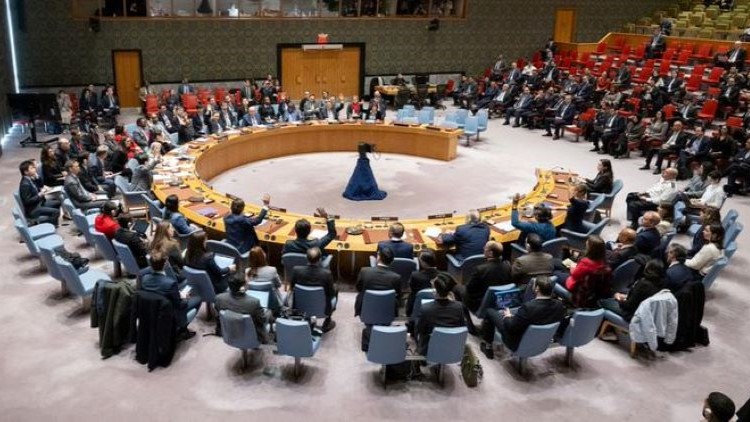Eduardo González
The Spanish Government yesterday applauded the decision of the Security Council to “finally demand an immediate ceasefire in Gaza”, after the highest decision-making body of the UN adopted a resolution, with the US abstaining, in the calling for a ceasefire during the month of Ramadan, the release of the hostages and the arrival of aid to Gaza.
“I celebrate the UN Security Council resolution demanding a ceasefire in Gaza and the immediate and unconditional release of all the hostages,” declared the President of the Government, Pedro Sánchez, through the X social network. “The UN mandate is in line with what Spain has defended since the beginning of the conflict,” he continued. “It is imperative that the resolution be fulfilled and humanitarian aid access be allowed,” he warned. “The materialization of the two States, Israel and Palestine, coexisting in peace and security, is the only realistic and viable solution for the region,” concluded the head of the Executive.
“We applaud the decision of the UN Security Council to finally demand an immediate ceasefire in Gaza,” declared the Minister of Foreign Affairs, José Manuel Albares, through his official account on the social network X. “It is urgent that large-scale humanitarian aid be brought in and that all the hostages be released,” he continued. “The violence that causes so much death and suffering must end,” he concluded.
Likewise, the minister condemned this past Sunday the confiscation of Palestinian lands in the occupied territories, which represents “a flagrant violation of international law, generates new tensions in the Middle East and hinders the peace that we so long for.”
The UN Security Council yesterday approved a resolution demanding “an immediate ceasefire” during the month of Ramadan, the “immediate and unconditional release” of the hostages and “the urgent need to expand the flow aid to Gaza”. The text was approved with fourteen votes in favor and the abstention of the United States.
Since the war in Gaza began last October, the Security Council has scrapped several texts due to the veto of one or more of its five permanent members (China, France, Russia, the United Kingdom, the United States). The conflict began with the Hamas attacks on October 7, which caused almost 1,200 deaths and the taking of 240 hostages, and continued with Israel’s daily bombings in Gaza, which have caused the death of more than 32,000 Palestinians, and with the almost total blockage of access to water, electricity and vital aid in this territory.
The new text, drawn up by the non-permanent members, has only four operative paragraphs and includes three main demands: an immediate ceasefire during the month of Ramadan, which began on March 11; the release of nearly 130 hostages captured by Hamas in Israel and the entry of humanitarian aid to Gaza.
Finally, the US decided to abstain instead of veto the text after the expression “permanent ceasefire” was replaced by “immediate ceasefire”, a modification that was described as “unacceptable” by the Russian ambassador, Vassily Nebenzia.
The US ambassador and permanent representative, Linda Thomas-Greenfield, highlighted that, with this resolution, the Security Council shows its “support” for the diplomatic efforts led by the United States, Qatar and Egypt to achieve an immediate and sustainable ceasefire, ensure peace, the immediate release of all hostages and help alleviate the suffering of Palestinian civilians in Gaza.
For his part, the Secretary General of the UN, António Guterres, declared on social network X that this resolution “must be implemented” because otherwise “it would be unforgivable.” Likewise, the EU High Representative for Foreign Policy, Josep Borrell, welcomed the UN resolution, which “needs urgent implementation by everyone.” The Israeli ambassador to the UN, who was invited to speak, warned that the fact that the text does not include a condemnation of Hamas represents “a stain that will never be forgotten.”
Last Friday, Russia and China vetoed a draft resolution led by the United States that did not call for an immediate and sustained ceasefire, but rather affirmed “its imperative necessity.” “The current draft is unambiguous and correct in its direction, demanding an immediate ceasefire, while the previous one was evasive and ambiguous,” stated China’s representative, Zhang Jun, about the new text.







